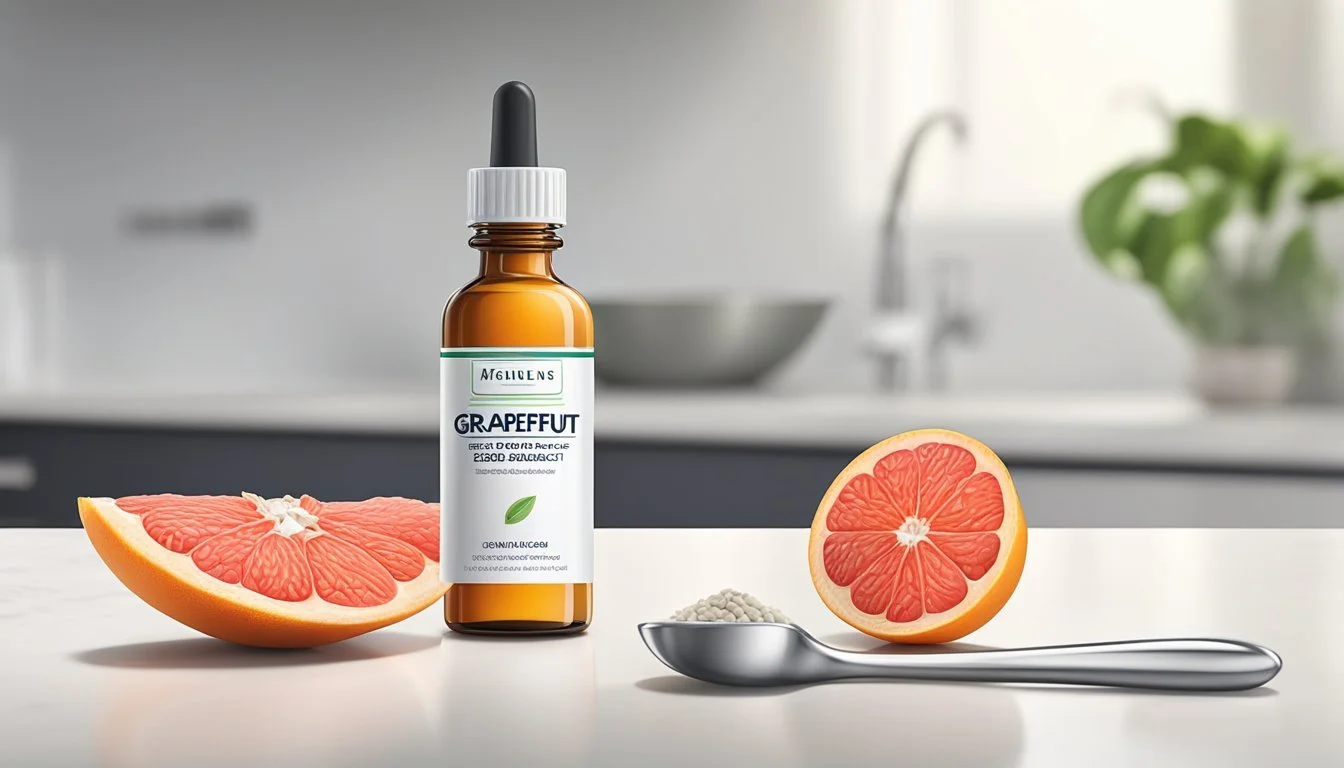What are the Health Benefits of Grapefruit Seed Extract?
Unveiling the Potent Nutritional Impacts
Grapefruit seed extract, commonly abbreviated as GSE, is derived from the seeds, pulp, and white membranes of the grapefruit. Positioned in natural health circles as a potent supplement, GSE is often utilized for its antimicrobial properties. The extract undergoes a process where it is ground down and usually mixed with glycerin, resulting in a product that enthusiasts claim supports various health needs.
The primary health benefits ascribed to grapefruit seed extract tap into its reputed ability to combat fungal infections, such as Candida albicans, a common yeast that can cause infections when overgrowth occurs. People also turn to GSE for aid against a spectrum of other microbial concerns, including throat gargles for colds, as a mouthwash for dental health, and even as a nasal wash for sinus issues.
While concrete scientific research in humans is limited, the anecdotal and preliminary support for the effectiveness of grapefruit seed extract is strong, and it is actively being marketed for its antibacterial and anti-inflammatory properties. It is available in various forms, including capsules and liquid concentrates, catering to those seeking alternative health solutions. Despite its bitter taste, many consider the purported benefits of GSE worth including in their health regimen.
Nutritional and Chemical Composition
Grapefruit seed extract (GSE) is recognized for its comprehensive array of beneficial components, which include key active compounds and a rich antioxidant profile critical for its health-promoting properties.
Key Active Compounds
The extract from grapefruit seeds is particularly rich in flavonoids, limonoids, and polyphenols, which are responsible for its health benefits. Among the flavonoids, naringenin stands out due to its potent bioactivity. These compounds are also associated with GSE’s antimicrobial and antifungal capabilities.
Flavonoids: Contribute to the antimicrobial and antifungal effects.
Limonoids: Known for enhancing the extract's therapeutic potentials.
Polyphenols: Play a significant role in the prevention of various diseases.
Naringenin: A flavonoid with strong antioxidative properties.
Antioxidant Profile
Antioxidants are vital for protecting the body from oxidative stress, and GSE is abundant in them, including vitamin C and polyphenols. These antioxidants scavenge free radicals, thereby potentially reducing the risk of chronic diseases.
Vitamin C: Critical for immune function and skin health.
Polyphenols: Offer defense against oxidative damage.
The presence of these antioxidants in GSE confirms its role in supporting human health through various biochemical pathways.
Health Benefits and Uses
Grapefruit seed extract (GSE) is recognized for its versatile applications ranging from anti-infective properties to supporting digestive and heart health. Utilizing its potent compounds, GSE serves both medicinal and personal care purposes backed by its antibacterial, antifungal, and antiviral attributes.
Anti-Infective Properties
GSE exhibits strong antimicrobial effects that can help combat a variety of infections caused by bacteria, viruses, and fungi. It is particularly noted for its efficacy against Candida albicans strains, which cause yeast infections. Traditionally, GSE has been used as a preservative and disinfectant due to these properties.
Antifungal: Effective in treating fungal infections such as athlete's foot and nail fungus.
Antibacterial: Potentially useful in managing bacteria-related issues, including urinary tract infections (UTIs).
Antiviral: Some research suggests GSE may offer protection against viral infections.
Digestive Health
The extract may have beneficial roles in supporting digestive health, thanks to its anti-inflammatory properties. It can help maintain a healthy gut flora, which is essential for a robust immune system.
Candida Management: GSE may aid in keeping Candida growth in check, mitigating problems like yeast overgrowth in the digestive tract.
Skin and Personal Care
GSE is attributed with several properties that have made it a common addition to skin and personal care products. The antioxidant properties of the extract contribute to its ability to soothe skin conditions.
Skin Infections: Applied topically for fungal conditions like athlete's foot or as a general treatment for promoting skin health.
Heart Health and Cholesterol
GSE has shown potential in contributing to heart health by impacting cholesterol levels in some studies. Its antioxidant capabilities may also be instrumental in cardiovascular protection.
Cholesterol: May assist in reducing high cholesterol, which is a significant risk factor for heart disease.
Potential Risks and Side Effects
While grapefruit seed extract offers several health benefits, it is important to be aware of its potential risks and side effects. Careful consideration is necessary when it comes to interactions with certain medications and the possibility of adverse reactions.
Interactions with Medications
Grapefruit seed extract can interfere with a wide range of medications, especially blood thinners. The extract may inhibit an enzyme called CYP3A4, which helps metabolize several drugs. Interference with this enzyme can lead to higher levels of the medication in the bloodstream, potentially leading to toxic effects.
Blood Thinners: For those on medication such as warfarin, increased risk of bleeding may occur.
Other Medications: Caution is advised with all medications metabolized by CYP3A4, as grapefruit seed extract could alter their effectiveness.
Adverse Reactions
The possibility of adverse reactions when using grapefruit seed extract cannot be overlooked. Side effects may range from mild gastrointestinal disturbances to more severe allergic reactions.
Mild Side Effects:
Gastrointestinal discomfort
Itchy skin or rashes
Severe Allergic Reactions:
Swelling of the lips, tongue, or throat
Difficulty breathing
It is also essential to note that some grapefruit seed extract products have been found to contain benzethonium chloride, a synthetic antimicrobial often used for its preservative qualities. The presence of such additives, which are not always disclosed on the label, can contribute to adverse effects.
Dosage and Administration
Grapefruit seed extract is a versatile supplement typically available in various forms, each requiring careful attention to dosage and administration for optimal benefits and safety.
Supplementary Forms
Grapefruit seed extract (GSE) is marketed in several forms, including:
Liquid Drops: Often used for their flexibility in adjusting dosage.
Capsules/Tablets: Provide a pre-measured and convenient option.
Powders: Can be mixed with liquids for internal use or used in homemade topical applications.
Proper Usage and Concentrations
When administrating GSE, it's critical to follow proper usage guidelines:
Internally:
The recommended dose for liquid form typically ranges from 10 to 20 drops, taken three times daily.
For powders or pills, a standard dose is around 200 mg, also taken three times a day.
Topically:
Concentrations vary based on the product and its intended use, such as in soaps or cosmetics.
For personal topical applications, users should heed product-specific instructions to determine the safe amount for use on the skin.
It's imperative for users to consult with healthcare providers before incorporating GSE into their regimen, particularly to understand potential interactions with other medications.
Frequently Asked Questions
This section addresses some of the common inquiries about grapefruit seed extract, including its potential side effects, benefits for the skin, recommended dosages, precautions for certain individuals, safe consumption frequency, and its various health applications.
What are the potential side effects of using grapefruit seed extract?
Grapefruit seed extract may cause side effects such as stomach upset and allergic reactions in some individuals. It is known to interact with certain medications, so one should consult with a healthcare provider before use.
How can grapefruit seed extract benefit the skin?
Grapefruit seed extract has been associated with antimicrobial properties, which can help in treating skin infections and promoting the healing of wounds. It may also act as an astringent for oily skin.
What is the recommended dosage of grapefruit seed extract for combating parasites?
The recommended dosage of grapefruit seed extract for addressing parasitic infections varies, but some sources suggest 10 drops of liquid extract in water or juice one to three times daily. It is essential to follow label instructions or consult with a healthcare provider.
What precautions should certain individuals consider before taking grapefruit seed extract?
Individuals taking prescription medications, particularly those that are metabolized by the liver's Cytochrome P450 enzymes, should use caution, as grapefruit seed extract can alter drug metabolism. Pregnant or nursing women and people with pre-existing medical conditions should consult a healthcare provider before use.
How often is it safe to consume grapefruit seed extract?
The safety of long-term or frequent use of grapefruit seed extract is not well-established. Therefore, users should limit their intake to the duration suggested on the product label or by a healthcare provider.
In what ways can grapefruit seed extract be effectively utilized for health purposes?
Grapefruit seed extract can be used in various forms such as a throat gargle, mouthwash, nasal wash, and ear drops. It is also taken orally for digestive disturbances, and to support the immune system. The form of application depends on the health issue being addressed.





